Beyond Sagan: How Bora-Hansgrohe raised their game
Procycling examines the German squad's rise from audacious project to number-two ranked team in the world
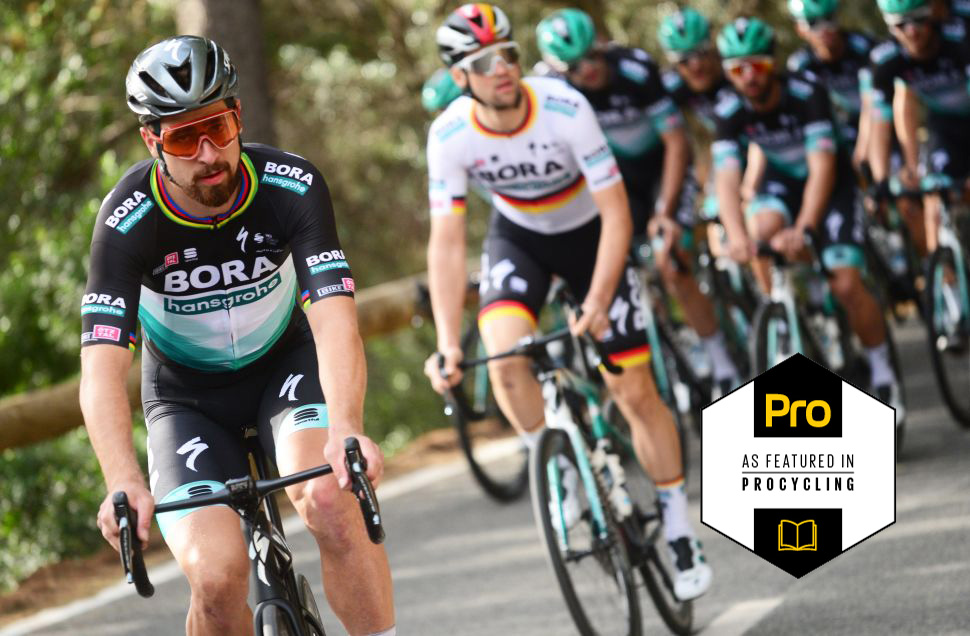
Procycling magazine: the best writing and photography from inside the world’s toughest sport. Pick up your copy now in all good newsagents and supermarkets, or get a Procycling print or digital subscription, and never miss an issue.
2019 marked Bora-Hansgrohe’s 10th birthday and, with 47 wins, it was their best season yet. In this article, from issue 263, December 2019, Procycling finds out how smart signings and a focus on development have turned the German squad into a WorldTour force.
When Bora-Hansgrohe made the step from ProConti level to the WorldTour in 2017, they were propelled by the signing of the world champion and the sport’s biggest star, Peter Sagan. It was a coup for the German outfit set up by Ralph Denk in 2010. Denk had hoped to reach the top tier a few years earlier but in Sagan he finally found his ticket.
The Slovakian promptly won the team their first Tour de France stage – although he was controversially thrown off the race for his part in a crash involving Mark Cavendish – and earned the sponsors another 12 months in the rainbow jersey with a record-equalling third world title in Norway. Sagan’s haul of 11 wins accounted for a third of the team’s overall tally at the end of the year.
To say it was a one-man team would be a stretch, given they also won stages at the Giro and Vuelta, and given Sam Bennett struck 10 times, but Sagan was the talisman.
In 2018 there was a slight shift. Sagan won Paris-Roubaix, Gent-Wevelgem and three stages at the Tour de France – not to mention a sixth green jersey – but his victory tally dropped to eight, while the team once again won 33 races. Bennett was now winning bigger, with three stages at the Giro, and Pascal Ackermann burst to the top of the sprinting ranks in the second half of the year.
2019 saw the ball taken and carried. Bora-Hansgrohe head into the off season having won no fewer than 47 races in 2019. How many came from Sagan? Just four. From a third to a 12th in the space of three seasons, that diminishing contribution tells the story of a team that no longer revolves around one man. Bora-Hansgrohe end the year as the number two ranked team in the world - behind Deceunink-Quick Step - and as so much more than ‘Sagan’s team’.
The latest race content, interviews, features, reviews and expert buying guides, direct to your inbox!
"We are the first losers maybe, but I am quite happy with our second place in the WorldTour and our 47 wins," Denk tells Procycling.
"A lot of guys contributed to our success – not just one or two. Also, when you consider we’ve been a WorldTour team for three years, to be outperforming some very big traditional teams, like Movistar, is great for us."
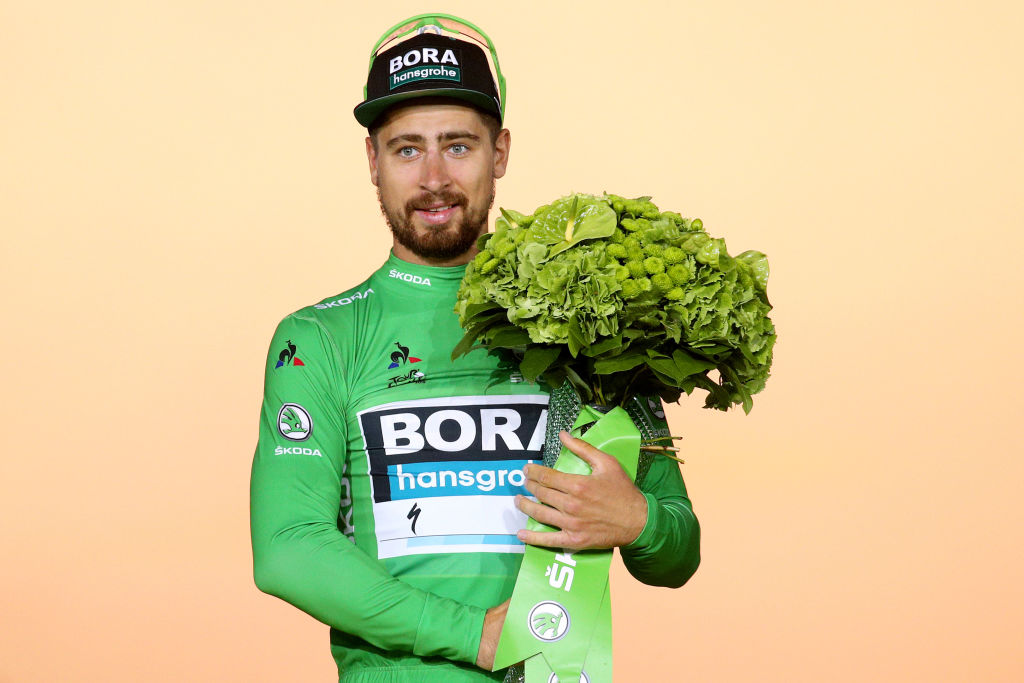
Sagan grabbed Bora’s first win of 2019 at the Tour Down Under but by the time he’d struck for a second time at the Tour of California in May – after his first barren classics campaign since 2015 – the team had already hared to 20, with six from Bennett, five from new signing Max Schachmann, and three from Ackermann. It was the two sprinters, Bennett and Ackermann, who would be the chief bread-winners, both ending the season on 13 wins.
Jumbo-Visma’s Dylan Groenwegen may have been ahead in terms of quantity, with 15, but it must be pointed out that only four of his came at WorldTour level, compared to seven for Ackermann and 11 for Bennett.
Getting 13 wins out of one sprinter is no mean feat; to do it with two is something else. The first challenge was dividing up the calendar. The Tour de France was very much Sagan’s domain, and the call was made to hand the Giro to Ackermann, leaving Bennett, who’d won three stages at the previous year’s corsa rosa, with the Vuelta.
The Irishman didn’t hide his discontent, but it’s a credit to his professionalism and to Bora’s rider management that he went on to be so productive. His two stage wins at the Vuelta matched Ackermann’s haul at the Giro – where Cesare Benedetti also won a stage – and the team’s versatility was underlined by Rafał Majka finishing sixth overall in both races.
As for the Tour, Sagan won a stage and collected a record-breaking seventh green jersey, but even there he was somewhat overshadowed, as Emanuel Buchmann surpassed all expectations to finish fourth overall. After coming fourth at the UAE Tour, third at Itzulia Basque Country, seventh at the Tour de Romandie, and third at the Dauphiné, it was truly a breakthrough year for the 26-year-old German stage racing talent, referred to in the team as 'the silent child'.
"When we went to the WorldTour, it was the goal to build the team around Peter, but it’s good to see others come through in his slip-stream," says Denk.
"It has to be said that Ackermann, Buchmann, Bennett... they have all grown because of Peter. He takes all the pressure from the media, the sponsors, the fans, and everything else. He is always the centre of attention, and the other guys are in the background. They can stay relaxed and develop quietly. That’s a big reason behind their success."
'We learnt from the bottom and grew together'
A shade over 10 years ago, during the 2009 World Championships in Mendrisio, Denk presented his project on the shores of Lake Lugano. He had a small sponsor and a small group of riders but big ambitions, voicing his desire to join what was then known as the ProTour within three years.
Eyebrows were raised, scepticism high at a time when cycling was effectively on its knees in Germany. Three years before, the Operación Puerto investigation, in which Jan Ullrich, winner of the 1997 Tour, was implicated, had laid bare widespread blood doping.
As faith in the sport slumped, a number of races, including the Deutschland Tour, disappeared from the calendar, while public broadcaster ARD stopped showing the Tour.
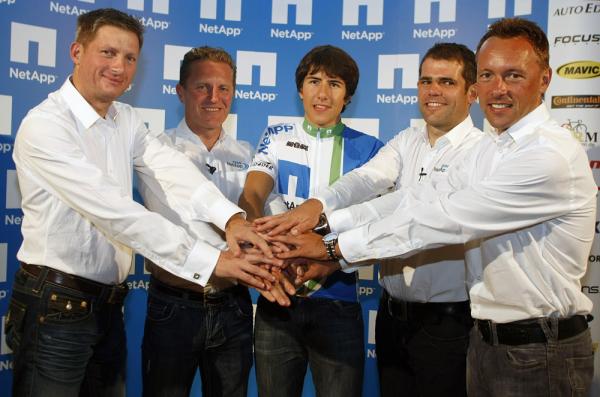
With a roster of 15 riders, Team NetApp started out in the Continental ranks, before gaining a ProConti licence in 2011 and riding their first grand tour at the Giro in 2012. In 2013 they took on a chunk of the Endura team in a merger, finishing top 10 at the Vuelta through Leopold König, and in 2014 they made their Tour debut. They solidified in 2015 and 2016 with new sponsors Bora and Argon-18, before hitting the WorldTour in 2017 with increased funds from Sagan’s bike sponsor Specialized, and from new title sponsor Hansgrohe.
“When we started out, it was a very small team but we took one or two steps more every year,” Andreas Schillinger, who has been with the team from the start, tells Procycling.
"You could feel a bit more money coming in each year and I think Ralph is really good at investing it. When he gets a bit more, he uses it wisely. A few years ago it was the nutrition; he hired a chef and brought a kitchen truck. Things like that have made a big difference.
"The way I see it, it was the perfect way to create a team. Everyone learns from the bottom, and grows together. We make mistakes, we learn, we change things. It’s not like we had a huge sponsor from the start and could go out and buy everything we wanted. We had to work on every single thing and it’s all been coming together little by little over the years.
"There has been a lot of influences coming in, not least when Sagan and Majka came, but things have come together and I think we are now seeing the fruit of all that work. This is the first year it’s really felt like Bora-Hansgrohe."
Thinking outside the box
Denk acknowledges he has made some "good decisions", although getting a tattoo of Sagan’s logo on his ankle – the honouring of a drunken bet – probably doesn’t count among them.
His budget, he says, is "more or less the same" as it was when they joined the WorldTour. Sagan and, to a lesser extent, Majka were the statement purchases at the time, but they’ve spent carefully since. Daniel Oss was hired in 2018 and helped Sagan to the Paris-Roubaix crown, while Davide Formolo and Felix Großschartner joined at the same time.
Schachmann was a top signing from Deceuninck this year, and the arrival of 23-year-old talent Lennard Kamna from Sunweb in 2020 bolsters a crop of German riders that is fast becoming the core of the team, even if Denk insists "it’s an international team – not a national team".
Instead of big splashes in the transfer market, the money has largely been spent on practical steps to professionalise the outfit, with investment in altitude training, aerodynamics and equipment.
"We like to think outside the box," Denk says, proudly pointing out that head of innovation Dan Lorang works with both Ackermann and Buchmann, and also with triathletes. "We’re not afraid to learn from other sports." He even sounds a little like Dave Brailsford when he adds: "A lot of small things like that create big success."
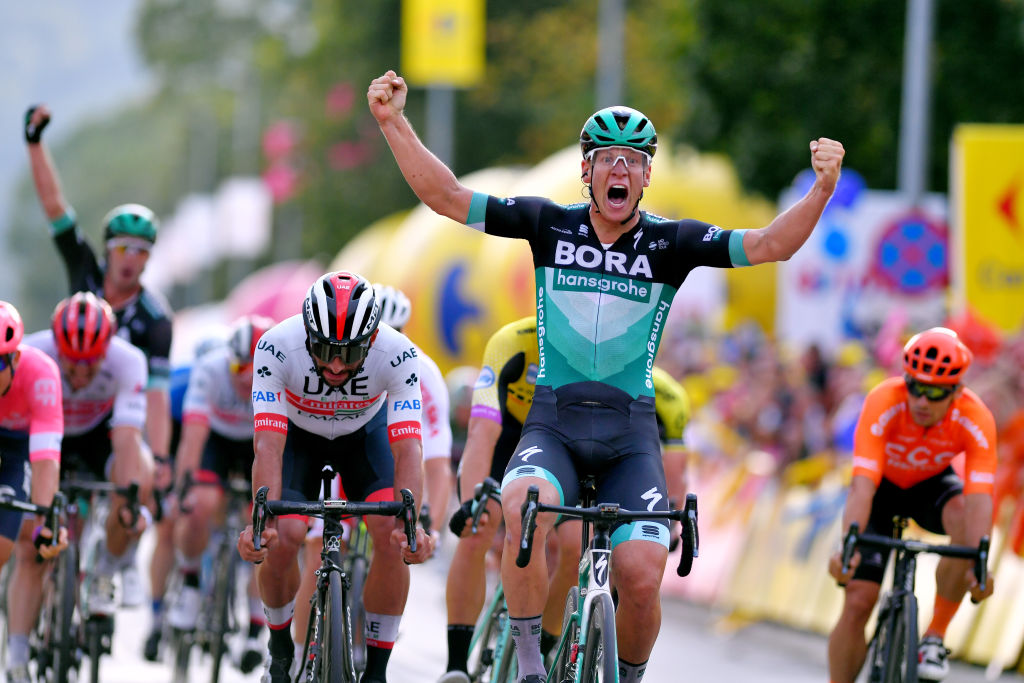
One area where Denk claims he’s breaking the mould is by racing less. Procyclingstats.com shows Sunweb, Bahrain-Merida and Mitchelton-Scott all did fewer race days in 2019, but Bora’s total of 242 days is still 10 below the WorldTour average.
"Ten or 15 years ago, riders would say, 'I’m targeting this race so I need to do this race and this race.' No. That’s not our way. We race to win – not to train," Denk says. "It’s hard to tell your sponsors, ‘Okay, next week we’re going to this race but it’s not really important.’ If we are on the start line, it must be with our best condition. So we reduce the race days and go full on training."
This approach, Denk says, suits the riders, and informs the team’s culture. "It’s the mix between being super professional, but then creating a good, relaxed atmosphere around that. It’s something I’ve learned from Peter and it’s become part of the philosophy of the team."
Schillinger talks of a "great team spirit" that runs not just between the riders but throughout the organisation. "The mechanics, chefs, coaches… everyone’s on an equal level, and everyone is respected. For me, that’s a big key to success.
"If it’s a GC day, Peter will go to the leaders and see if he can help. When it’s a flat stage, the GC guys ask how they can help the sprinters. Respect works both ways, and if you have the leaders showing it to someone like me, for example, that’s very powerful."
That spirit could have something to do with Schillinger’s earlier comments that the team have been on a shared journey. Of the 27 riders on this year’s roster, 12 were part of the ProConti outfit of 2016, and three were there at the very start. So when one of them, Benedetti, raised his arms across the line first in Pinerolo on stage 12 of the Giro, it would be Denk’s highlight of 2019. "Cesare was one of the first guys I signed. He’s super loyal, and always works so hard for his teammates. That was a perfect moment."
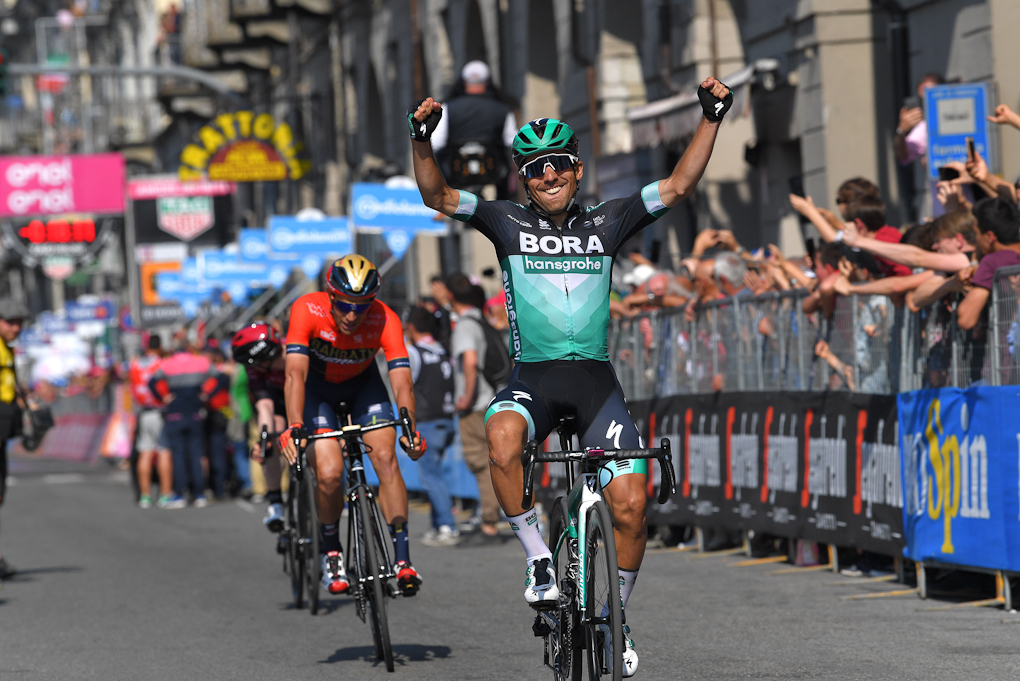
Looking back to Lake Lugano all those years ago, we ask Denk if he ever could have imagined all of this.
"For sure I imagined it. I always believed in my dreams. That’s my philosophy; if you give your best every day, success will come," he insists. "Okay, it took seven years rather than three to get to the WorldTour. I have learned to be patient, but it will come."
Not that Denk is resting on his laurels. It’s interesting that, when discussing Bora’s 2019 campaign, he describes himself as ‘quite’ happy, and refers to second place in the WorldTour rankings as ‘first losers’. Behind the understated facade, ambition burns bright, and the focus is not on what has been achieved but on what’s left to achieve.
"We won a big classic in Paris-Roubaix and Peter won a world title with us in 2017. In the sprints and the classics, we are already super strong,” he says. “We are still making steps in the grand tours. We made a big one this year, but on this point we are still improving."
And there’s more to come, he adds: "We are not done yet."
Procycling magazine: the best writing and photography from inside the world’s toughest sport. Pick up your copy now in all good newsagents and supermarkets, or get a Procycling print or digital subscription, and never miss an issue.
Follow @Procycling_magazine
Patrick is a freelance sports writer and editor. He’s an NCTJ-accredited journalist with a bachelor’s degree in modern languages (French and Spanish). Patrick worked full-time at Cyclingnews for eight years between 2015 and 2023, latterly as Deputy Editor.
